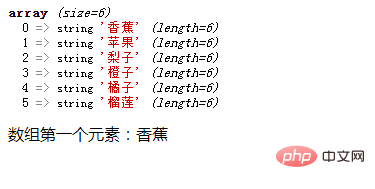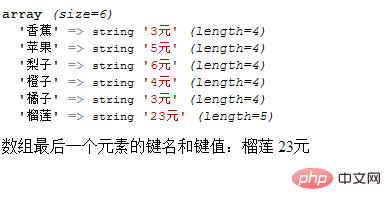
In the previous article "PHP Array Learning: Obtaining the First/Last Element (1)", I introduced you to the method of obtaining the first element and the last element of the array, but The essence of this method is to take out the elements and then return them. The first and last elements returned do not exist in the array. But sometimes we just want to get the first and last elements of the array and don't want to change the array, so what should we do?
In fact, it is very simple. The built-in functions reset() and end() in PHP can be implemented. Today we will take you to understand the reset() and end() functions, and use code examples to see how the reset() and end() functions obtain the first and last elements of the array. (Attachment:PHP function array array function video explanation)
Every array in PHP has an internal pointer, that is, the array pointer; this pointer will point to an element in the array ( This element is the current element of the array).
The array pointer initially points to the first element in the array by default, and then by moving or changing the position of the pointer, any element in the array can be accessed.
The reset() and end() functions can change the pointer position:
reset() function: you can point the internal pointer in the array to the first element , and returns the value of the element.
end() function: You can point the internal pointer in the array to the last element and return the value of the element.
Let’s learn more about it through code examples.
reset() function gets the first element of the array
##Example 1:

Instance 2:
"3元","苹果"=>"5元","梨子"=>"6元","橙子"=>"4元","橘子"=>"3元","榴莲"=>"23元"); var_dump($arr); //获取数组中的第一个元素 $first = reset($arr); echo "数组第一个元素的键名和键值:".key($arr)." ".$first; ?>
reset($arr)Point the internal pointer in the array to the first element, then the "current element" of the array at this time is its first element ""Banana"=>"3 yuan"", soecho $firstwill output "3 yuan", and the key name obtained usingkey($arr)is the key name of the first element ""Banana"".
The key() function can get the key name of the current element of the array, and the key value can be returned using the current() function.
end() function gets the last element of the array
"3元","苹果"=>"5元","梨子"=>"6元","橙子"=>"4元","橘子"=>"3元","榴莲"=>"23元"); var_dump($arr); //获取数组中的第一个元素 $last = end($arr); echo "数组最后一个元素的键名和键值:".key($arr)." ".$last; ?>

echo $lastwill output "23 yuan",key($arr)will return the key name of the last element ""Durian"".
Recommended:《PHP interview questions summary (collection)》《php video tutorial》
The above is the detailed content of PHP array learning: Obtaining the first/last element (2). For more information, please follow other related articles on the PHP Chinese website!




